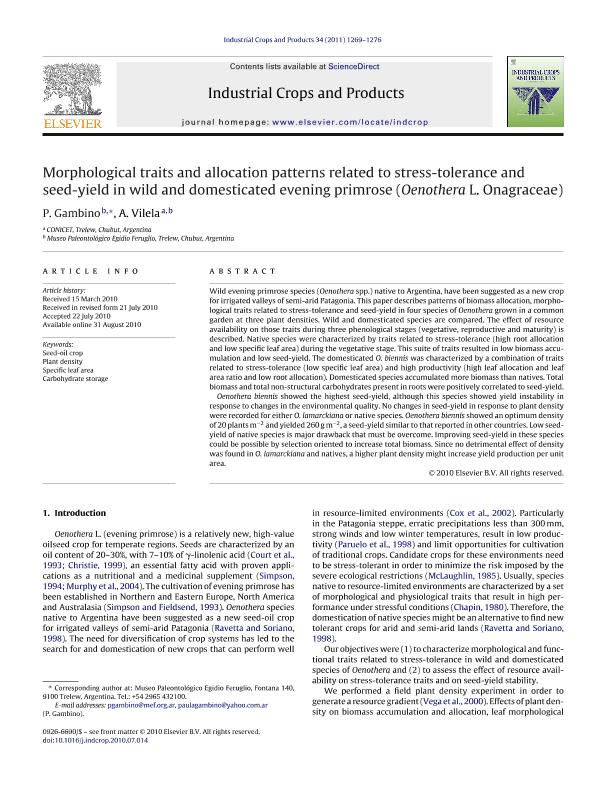Artículo
Morphological traits and allocation patterns related to stress-tolerance and seed-yield in wild and domesticated evening primrose (Oenothera L. Onagraceae)
Fecha de publicación:
09/2011
Editorial:
Elsevier Science
Revista:
Industrial Crops and Products
ISSN:
0926-6690
Idioma:
Inglés
Tipo de recurso:
Artículo publicado
Clasificación temática:
Resumen
Wild evening primrose species (Oenothera spp.) native to Argentina, have been suggested as a new crop for irrigated valleys of semi-arid Patagonia. This paper describes patterns of biomass allocation, morphological traits related to stress-tolerance and seed-yield in four species of Oenothera grown in a common garden at three plant densities. Wild and domesticated species are compared. The effect of resource availability on those traits during three phenological stages (vegetative, reproductive and maturity) is described. Native species were characterized by traits related to stress-tolerance (high root allocation and low specific leaf area) during the vegetative stage. This suite of traits resulted in low biomass accumulation and low seed-yield. The domesticated O. biennis was characterized by a combination of traits related to stress-tolerance (low specific leaf area) and high productivity (high leaf allocation and leaf area ratio and low root allocation). Domesticated species accumulated more biomass than natives. Total biomass and total non-structural carbohydrates present in roots were positively correlated to seed-yield.Oenothera biennis showed the highest seed-yield, although this species showed yield instability in response to changes in the environmental quality. No changes in seed-yield in response to plant density were recorded for either O. lamarckiana or native species. Oenothera biennis showed an optimum density of 20plantsm-2 and yielded 260gm-2, a seed-yield similar to that reported in other countries. Low seed-yield of native species is major drawback that must be overcome. Improving seed-yield in these species could be possible by selection oriented to increase total biomass. Since no detrimental effect of density was found in O. lamarckiana and natives, a higher plant density might increase yield production per unit area.
Palabras clave:
Carbohydrate Storage
,
Plant Density
,
Seed-Oil Crop
,
Specific Leaf Area
Archivos asociados
Licencia
Identificadores
Colecciones
Articulos(SEDE CENTRAL)
Articulos de SEDE CENTRAL
Articulos de SEDE CENTRAL
Citación
Gambino, Paula; Vilela, Alejandra Elena; Morphological traits and allocation patterns related to stress-tolerance and seed-yield in wild and domesticated evening primrose (Oenothera L. Onagraceae); Elsevier Science; Industrial Crops and Products; 34; 2; 9-2011; 1269-1276
Compartir
Altmétricas




